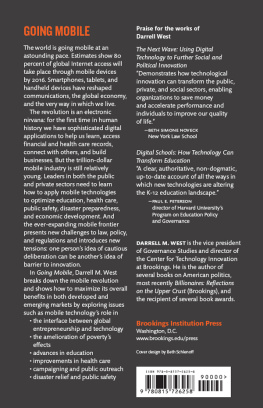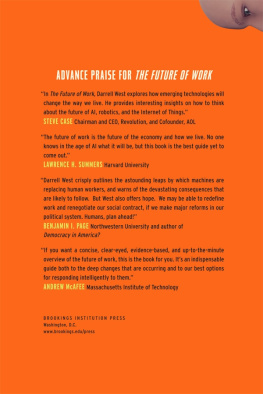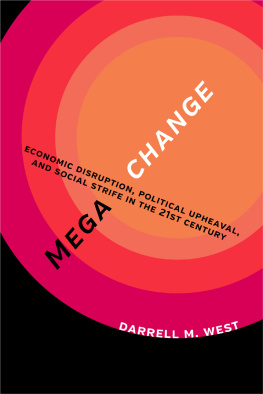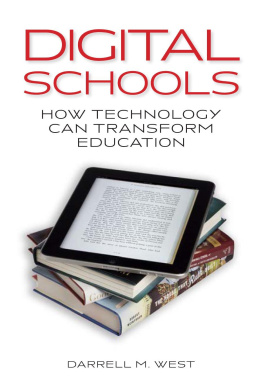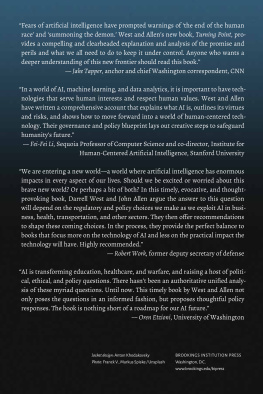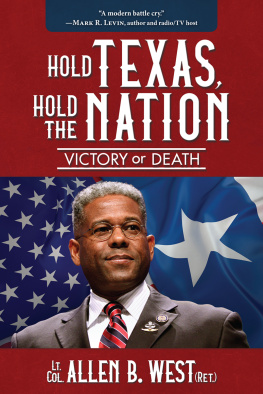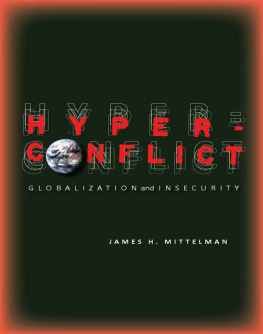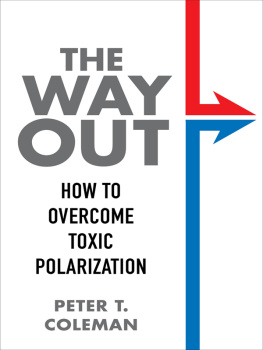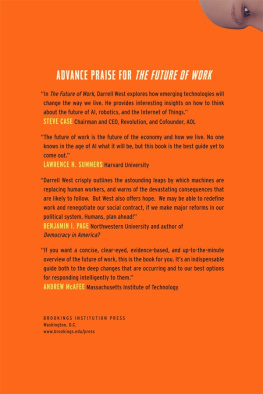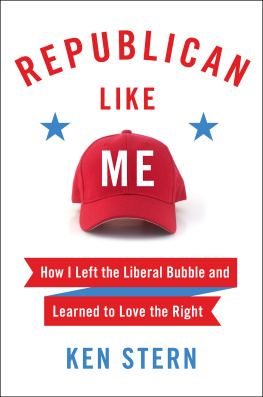DIVIDED POLITICS, DIVIDED NATION
HYPERCONFLICT in the TRUMP ERA
DARRELL M. WEST
BROOKINGS INSTITUTION PRESS
Washington, D.C.
Copyright 2019
THE BROOKINGS INSTITUTION
1775 Massachusetts Avenue, N.W., Washington, D.C. 20036
www.brookings.edu
All rights reserved. No part of this publication may be reproduced or transmitted in any form or by any means without permission in writing from the Brookings Institution Press.
The Brookings Institution is a private nonprofit organization devoted to research, education, and publication on important issues of domestic and foreign policy. Its principal purpose is to bring the highest quality independent research and analysis to bear on current and emerging policy problems. Interpretations or conclusions in Brookings publications should be understood to be solely those of the authors.
Library of Congress Cataloging-in-Publication Data
Names: West, Darrell M., 1954 author.
Title: Divided politics, divided nation : hyperconflict in the Trump era / by Darrell M. West.
Description: Washington, D.C. : Brookings Institution Press, 2019. | Includes bibliographical references and index.
Identifiers: LCCN 2019001457 (print) | LCCN 2019002324 (ebook) | ISBN 9780815736929 (ebook) | ISBN 9780815736912 (hardcover : alk. paper)
Subjects: LCSH: Political cultureUnited States. | Polarization (Social sciences)Political aspectsUnited States. | Trump, Donald, 1946 | United StatesPolitics and government2017 | United StatesPolitics and governmentPublic opinion.
Classification: LCC JK1726 (ebook) | LCC JK1726 .W4 2019 (print) | DDC 973.933dc23
LC record available at https://lccn.loc.gov/2019001457
9 8 7 6 5 4 3 2 1
Typeset in Goudy Oldstyle
Composition by Elliott Beard
To Ken, Joanne, and Shirley
United we stand, divided we fall.
CONTENTS
PREFACE
UPHEAVAL
I watched the 2016 election returns in stunned silence. Along with nearly every other political expert, I thought Democrat Hillary Clinton would coast to victory over Republican Donald Trump. I had heard her speak at the Brookings Institution in Washington, D.C., where I worked, and been impressed with her in-depth knowledge about a wide range of issues.
This was in stark contrast to her GOP opponent, who came across as rash and impulsive during the campaign, and not very informed. He had started his quixotic quest for the presidency by condemning Mexican immigrants and calling for an America First policy that repudiated decades of U.S. global engagement.
Four years earlier, I had seen his combative nature up close. In 2012, when Republicans were considering him for a prime-time speaking role at their national convention, I had taken a playful jab at him in a media commentary. Republicans should send Trump on an all-expenses-paid trip around the world at the time of their convention, I joked. If the party gives him a prominent platform, he brings nothing but trouble to the GOP.
The morning this quote appeared in Politico , I received a call from Lauren Kelly, Trumps executive assistant. She asked for my e-mail address, which I gave to her. Shortly thereafter, I received an e-mail in which the billionaire had pasted my quote into the message and written in big, black, bold letters Darrell, you are a fool. Best wishes, Donald J. Trump. I was stunned the celebrity cared what an academic said about him.
Two years later, I published a book called Billionaires that detailed the political clout of the ultrawealthy.
Sitting at my desk one day, the phone rang with the caller ID of Trump Org. The caller was not Trump but his bulldog lawyer, Michael Cohen, the fixer who paid porn star Stormy Daniels $130,000 during the campaign to keep quiet about her affair with Trump.
My answer to the attorney was in the negative, but after witnessing Trumps thin skin and erratic performance during the campaign, I was dumbfounded in 2016 when he won the top office. Speaking to ordinary folks across the country who had not shared in economic prosperity, Trump told them they had been betrayed by coastal elites who had pushed bad trade deals and flawed economic programs. Expertsof the sort I worked with at Brookingshad sold them down the river, he said, and it was necessary to take decisive action that would disrupt the status quo and make America great again. According to Trump, it was time to enact fundamental changes and restore the country to its preeminent position of an earlier era, when America was not undermined by illegal immigrants, corrupt leaders, and deceitful reporters.
His victory represented just the latest upheaval in U.S. and global politics. Over the several decades I had been analyzing politics, there were a number of shocking shifts. In 1989 the Berlin Wall fell and the Cold War with the Soviet Union ended. Republicans upended five decades of Democratic rule in 1994, when they seized control of Congress and kept it for most of the next two decades. China has emerged as a global power and is flexing its economic and political might.
As if that were not enough, the twenty-first century generated another set of earthquakes that rocked the world. Technology innovation ushered in a digital world with tasks handled by robots and artificial intelligence. Same-sex marriage was legalized, and marijuana use no longer was considered a crime. Fundamentalism and terrorism surged in many parts of the world. Minorities and immigrants were rising in number in the United States, leading to predictions that whites would soon lose their majority status.
The result of all these developments is an American landscape infused with partisanship, polarization, and mutual intolerance. Simmering tensions over politics, economics, and culture have metastasized into an overarching us-versus-them environment. The idea of a melting pot, where people of different backgrounds and viewpoints fuse into peaceful coexistence, seems a quaint relic of another time.
As these profound changes were unfolding, I had a front-row seat on the national transformation. I grew up in the 1960s and 1970s in a conservative community in rural Ohio. The church sermons there were full of fire and brimstone. Visiting my mothers local church in 2004, I heard Pastor Ralph Gutowski of the Fairhaven Community Church preach about the evils of abortion, gays, and evolution. Abortion is immoral, he proclaimed. Gay lifestyles are a sign of decadence. Evolution runs contrary to the biblical story of creation. Western civilization is in decline because few people pay attention to the teachings of Jesus Christ.
At a personal level, this moralizing was awkward because sitting nearby was my gay brother, Ken, who could not believe his lifestyle was being attacked. My two sisters, Joanne and Shirley, were also in attendance; they had married local farmers and still lived in our hometown. They were Christian fundamentalists who were members of this congregation and generally supportive of what the minister was saying.
Most of the time, the four of us avoided politics and religion because we knew our family was at ground zero of the red state--blue state divide. Indeed, the social, economic, and political divisions associated with that conflict in many respects were the story of our lives. We had circled warily around one another for years, not wanting to lance the boil for fear it would lead to irreconcilable differences.
But with its pointed attack on my brother, Ralphs sermon was hard to ignore. The after-church lunch with my three siblings was tense. Over food, we tried to be on good behavior because my mother was seventy-nine and not in good health. It would turn out to be the last year of her life. We passed most of the lunch catching up on gossip and hearing what our local friends and relatives were doing.


